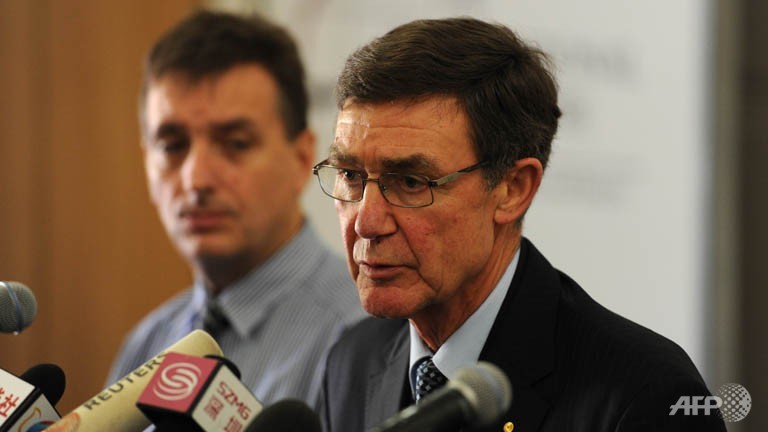Australia warns MH370 search could take "long time"

Retired Australian air chief marshall Angus Houston speaks about the missing Malaysia Airlines flight MH370 at a press conference in Perth on April 1, 2014. (AFP/POOL/Greg WOOD)
>> Malaysia corrects last words from Flight MH370
PERTH: Australia warned Tuesday the hunt for missing Flight MH370 could be long and frustrating as a vessel equipped with a specialised "black box" locator raced against the clock to reach the Indian Ocean search area.
Despite an extensive multinational search southwest of Perth, no wreckage has been identified since the Malaysia Airlines plane vanished on March 8, with objects retrieved from the desolate seas turning out to be fishing gear or flotsam.
Retired Australian air chief marshal Angus Houston, who is heading a new coordination centre in Perth, said it was the most challenging search and rescue operation he had ever seen and cautioned about any quick fixes.
"I say that because the starting point whenever you do a search and rescue is the last known position of the vehicle or aircraft. In this particular case, the last known position was a long, long way from where the aircraft appears to have gone," he said in a press conference.
Houston noted that it look more than 60 years to find HMAS Sydney, which was sunk in the Indian Ocean in 1941 by a German warship, and the search for MH370 is "not something that's necessarily going to be resolved in the next two weeks".
"This could drag on for a long time but I think at this stage that it's very important to pursue all the leads," he added, as 10 planes and nine ships, some with helicopters, resumed the search in worsening weather.
Houston also said that "if we don't find the wreckage of MH370, we will need to review what to do next."
Malaysia believes the flight, which was en route from Kuala Lumpur to Beijing carrying 239 people, was deliberately diverted by someone on board and that satellite data indicates it crashed in the Indian Ocean.
Houston's appeal for patience contrasts with the angry demands of Chinese passengers' relatives who are desperate for firm information on what happened to their loved ones.
Australian vessel Ocean Shield, fitted with a US-supplied black box detector known as a "towed pinger locator", left Perth on Monday but is expected to take up to three days to reach the search zone.
The signal from the black box -- which records flight data and cockpit voice communications -- usually lasts only about 30 days and fears are mounting that time will soon run out.
Australian Defence Minister David Johnston admitted there was only a slim chance it would be found as debris needs to be positively identified first to nail down a crash site.
"We've got about a week (left), but it depends on the temperature of the water and water depth and pressure as to how long the battery power will last," he told Australian radio.
Authorities are scouring a massive expanse of ocean for clues and even if the zone is narrowed down, Ocean Shield must tow the equipment at just five kilometres per hour (3.1 mph) for the pinger to be able to pick up a signal.
If floating MH370 debris is eventually found, authorities plan to analyse recent weather patterns and ocean currents to track back to where the plane went down.
The seven-nation search effort resumed hours after Malaysia's civil aviation department said the last words spoken by one of the pilots on the doomed flight were "Good night Malaysian three seven zero".
The phrasing was different to the more casual "All right, good night" originally reported.
Aviation experts said the correction to the cockpit wording did not raise any red flags about possible pilot intent.
"There is plenty about Malaysia's handling (of MH370) over which questions may be raised, but I think in the scheme of things this is inconsequential," said Scott Hamilton, managing director of US-based aviation consultancy Leeham Co.
Shortly after the final message, communications were cut and the Boeing 777 vanished from civilian radar.
Malaysia insists it has been transparent, rejecting Chinese relatives' accusations it is guilty of incompetence or even a cover-up, but has repeatedly changed tack on what happened.
Notably, there have been about-turns regarding the crucial sequence of events in the cockpit before the plane veered off course, and Malaysia's air force has been criticised for failing to intercept it when it appeared on military radar.
Critics took aim on social media, saying the changed narrative on the cockpit communication showed continued bumbling.
"The Malaysian government can't even get the cockpit sign-off right. Why would we expect they get anything else correct?" said one posting on Twitter.
Malaysian Prime Minister Najib Razak is expected in Perth on Wednesday to tour the air base being used a staging post.
![]()
What the stars mean:
★ Poor ★ ★ Promising ★★★ Good ★★★★ Very good ★★★★★ Exceptional
Latest News
More News
- Russian President congratulates Vietnamese Party leader during phone talks (January 25, 2026 | 09:58)
- Worldwide congratulations underscore confidence in Vietnam’s 14th Party Congress (January 23, 2026 | 09:02)
- Political parties, organisations, int’l friends send congratulations to 14th National Party Congress (January 22, 2026 | 09:33)
- 14th National Party Congress: Japanese media highlight Vietnam’s growth targets (January 21, 2026 | 09:46)
- 14th National Party Congress: Driving force for Vietnam to continue renewal, innovation, breakthroughs (January 21, 2026 | 09:42)
- Vietnam remains spiritual support for progressive forces: Colombian party leader (January 21, 2026 | 08:00)
- Int'l media provides large coverage of 14th National Party Congress's first working day (January 20, 2026 | 09:09)
- Vietnamese firms win top honours at ASEAN Digital Awards (January 16, 2026 | 16:45)
- ASEAN Digital Ministers' Meeting opens in Hanoi (January 15, 2026 | 15:33)
- ASEAN economies move up the global chip value chain (December 09, 2025 | 13:32)
















 Mobile Version
Mobile Version